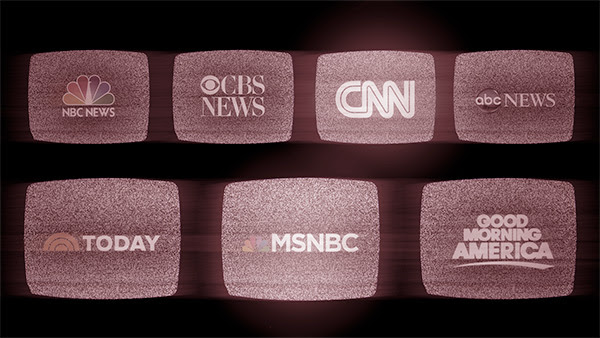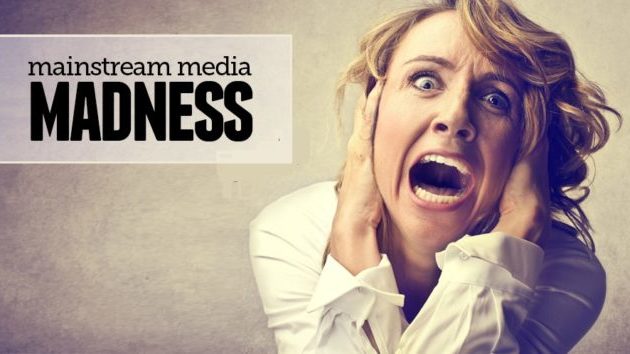Current Media Being Crippled By Culture and Technology
Two coinciding culture points are flowing side-by-side to suggest an ongoing revolution in communications — one that could both dramatically change how Americans choose their communication channels while sharply undermining the influence of the mainstream media.
 Number one: We, driven by the media and our celebrity culture, have made American presidents out to be far more important in our daily lives than they really are, and certainly should be.
Number one: We, driven by the media and our celebrity culture, have made American presidents out to be far more important in our daily lives than they really are, and certainly should be.
Number two: The media, largely responsible for No. 1, is again late to see an ongoing revolution in the communications industry, just as it has consistently during the past 25 years.
Here’s how it works.
I’m listening to the radio while working and the top news story at the top of the hour is that Trump has narrowed the list to 12 people who he thinks might be the Anonymous that wrote the utterly unsubstantiated hit piece the New York Times chose to run. The next story was the ongoing circus of clowns and disruptors at the Kavanaugh hearing, followed by the traffic report.
No “news” impacting Americans’ lives in any way until the traffic report. So it goes almost every day, with endless stories about what Trump said or did. It was similar with Obama, just fawning instead of attacking. Trump loves this. So did Obama, every bit as much.
Yes, the media is dishonest as an industry now (however, not every individual in the media) and is only trusted by those within its own worldview silo. Yes, the media is partisan. Yes, the media is chock full of self-aggrandizers from WaPo’s pompous “democracy dies in darkness” to the preening self-puffery of CNN’s Jim Acosta. Yes, the media is actively working to overturn an elected President of the United States. All of this works to undermine the credibility of the media — but only with about half of the country.
The reality is that the media’s hyper-focus on a president is both lazy and dangerous, because it elevates everything a president says or does in a way that is not reflective of reality. It in no way affects Americans’ lives that Trump has narrowed his list to 12. It will not affect Americans’ lives outside of politicophiles when he names the person and fires him or her. Nothing changes in Americans’ lives when he tweets out mean things (almost always in reaction, FYI) or that people in Washington say mean things about him. It is largely is irrelevant to our day.
What does affect Americans are his policies and those enacted by Congress. On that front, we get more about Michelle Obama’s arms in some wondrous dress or that Melania Trump once wore questionable shoes than we do about actual economic policy that really does affect Americans.
The intended portrayal is that Trump is a bad person. Maybe. But the people shouting that the loudest are the people who have been telling us for years there is no objective moral truth. But so what? Is he a bad president? Jimmy Carter was a very good person and a terrible president. Bill Clinton was a very terrible person but a decent president. FDR was a flaming racist against blacks, imprisoned Japanese Americans for having Japanese heritage and tried to expand the Supreme Court for his own political gain. Really bad stuff. But on the foreign front, he was a good president. LBJ was a really bad dude and a pretty bad president. Reagan was a decent guy and a great president.
The point is that there is no correlation between the “goodness” of a president and whether the president is good for the country — which is what actually matters for the president. Yes, we’d greatly prefer a person of high moral character, but what is most relevant is a person who acts in the historical interests of the United States, defends the Constitution, individual liberties and the institutions and foundations that made us exceptional, and pursues sound policy for the benefit of all Americans. That’s what matters.
Yet the media hyper-focuses on all the wrong things (particularly in support of their partisan agenda) which elevates the importance of the president in American minds to demigod status. Trump cannot destroy the country if he wanted. (He doesn’t.) Neither could Obama (Jury is out on whether he wanted to or not.)
This is part and parcel with our celebrity-enthralled culture, which is pretty much bad for everyone. So yes, some is on all of us.
Meanwhile, on point No. Two, mega-podcaster Joe Rogan interviewed Elon Musk for 2 1/2 hours the other day in a substantial, eye-opening, sometimes thought-provoking way — clearly providing insights into Musk that no media coverage ever has. Musk told Rogan it’s “easy to demonize people” but that when you do so, “you’re usually wrong about it.” So true. Rogan’s language is rough, but his long-form interviews are incredibly valuable and he is a premier interviewer in drawing out deep wells of information from his guests. Here’s the deal. Rogan is not a trained journalist in any way. He was a standup comic, a reality show host, and entrepreneur and now the most popular in podcasting — which continues to grow rapidly.
Rogan is hardly alone. He’s joined by so many news and information podcasters that the media has finally realized maybe this podcasting is a thing. The New York Times launched The Daily podcast maybe 18 months ago and it exploded. It’s a slick, 20-minute or so conversation with reporters on a single topic. Others have jumped in, trying to grab the band wagon.
But the key here is that podcasting is an incredibly diverse platform and, unlike Youtube, Facebook and Twitter, it is not centralized in the hands of progressives with their instinct towards censorship of things like “hate speech” — which is only definable in personal opinions and on which there can be no limit, meaning anything is censorable.
Honestly, I get an enormous amount of my information now from podcasts and social media. This continues the siloing effect of information, of course, but that is on the media and its penchant for dishonesty. If they had not become so partisan and then been dishonest about it, the door would not have been so wide open when the technology arrived.
Rogan is just an example. (And FYI, he’s not some kid. He’s 51.) There are news podcasts, lots of commentary podcasts, repurposed TV news podcasts, and podcasts on every subject out there. The uniqueness is that you can be doing other things while listening, from working out to working in the garage to driving to most anything that does not require all your full concentration. And all on demand — not just when it comes on according to a schedule.
Further, it is long form. It’s interesting that as our attention span has diminished with TV, then video games and then down to 140 characters on Twitter and emoji texting, podcasts actually take us the other direction — expanding our attention span and making us think more in-depth. That is good for Americans and America, bad for the media (and arguably the Democratic Party and D.C. establishment.)
Remember, though, it’s not just the tech platform changing, it’s the content.
A lot of podcasters, and youtubers when they are not being censored, are going more in-depth and going longer than the short media hits that tend to totally miss context and full information. I think that is the revolution the media is missing, because people want not just more honesty, but actually more depth, than the media has been providing for a long time.
And that makes the media less influential. And that is a very good thing.
EDITORS NOTE: This column originally appeared on The Revolutionary Act.



Leave a Reply
Want to join the discussion?Feel free to contribute!